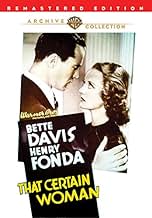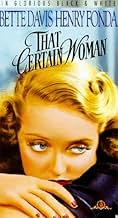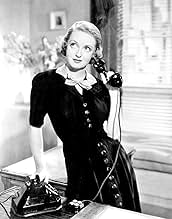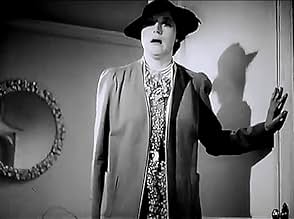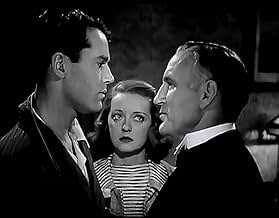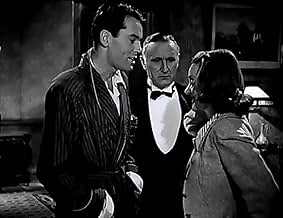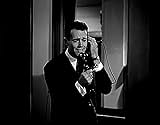IMDb RATING
6.4/10
1.8K
YOUR RATING
Mary Donnell, a young legal secretary with a past, elopes with a client's son, but his father has the marriage annulled without knowing she's pregnant.Mary Donnell, a young legal secretary with a past, elopes with a client's son, but his father has the marriage annulled without knowing she's pregnant.Mary Donnell, a young legal secretary with a past, elopes with a client's son, but his father has the marriage annulled without knowing she's pregnant.
- Awards
- 1 win total
Katharine Alexander
- Mrs. Rogers
- (as Katherine Alexander)
Mary Philips
- Amy
- (as Mary Phillips)
Richard DeNeut
- Boy
- (as Dickie DeNeut)
John Hamilton
- American
- (scenes deleted)
Edward Keane
- Opposing Counsel
- (scenes deleted)
- Director
- Writer
- All cast & crew
- Production, box office & more at IMDbPro
Featured reviews
Secretary Bette Davis has her dishonorable past unearthed after a reporter breaks the story that she's the widow of a notorious gangster once involved in the St. Valentine's Day Massacre; this leads to the quick dissolution of Davis' even quicker marriage to Henry Fonda, but not before Bette can conceive a child! A few dry, amusing wisecracks in this remake of the silent drama "The Trespasser"--and some unintended laughs and head-scratching details as well. Davis keeps refusing offers of cigarettes (!), she types a letter to Fonda we never get to read, she packs her kid off without his toys and then blows forlornly on his whistle. The kid is a solemn tyke who seems to have a fixation on being a sailor, even while Fonda's new wife pays Davis a visit (in a wheelchair!) and trades confessions with her in front of a roaring fire which never seems to die down. Busy programmer would not be of much interest were it not for Bette's terrific performance; she's serious and focused--and sensitive when she should be--and she grounds this story in a bit of reality. Henry Fonda and the supporting players are also very good, especially Mary Phillips as Amy. The film opens confusingly and takes a while to get its bearings, yet the sequence where Bette meets her father-in-law for the first time is a superbly controlled dramatic moment in which everyone excels. Not a particularly witty or gripping picture, but certainly not bad, either. **1/2 from ****
This is a superior and under-rated "woman's picture" that really has all the elements of the classic weeper: star-crossed lovers, twists of fate, and self-sacrifice. It also has a sterling performance from Bette Davis which gives a strong indication of why she would soon be a superstar and regarded as the screen's best actress: Her belief in a character could suffuse it with passion and poignancy and transcend the shallowness of the accompanying story. She's supported by an excellent cast - Henry Fonda (in a basically thankless role), the ever-reliable Donald Crisp (her showdown scene with him oddly foreshadows similar scenes with Gladys Cooper in NOW, VOYAGER), Mary Phillips (in a role that in a later version would obviously have gone to Thelma Ritter), who was, at the time, Mrs. Humphrey Bogart (in the same year's MARKED WOMAN Davis would appear with Mayo Methot, the next Mrs. B., and Ian Hunter. Edmund Goulding, who excelled at this kind of thing, wrote and directed it - he would later direct Davis in two other notable soapers, DARK VICTORY (one of her most celebrated performances, as Judith Traherne), and THE GREAT LIE (for which Mary Astor won a Best Supporting Actress Oscar). It's all served up in the best Warner Bros. tradition, but doesn't seem to be as well-remembered as other such films of the era, such as MAGNIFICENT OBSESSION, STELLA DALLAS, or MY FOOLISH HEART.
Yes, it's a ridiculous, confusing plot. Yes, the characterizations are clichéd archetypes. The portrayal of her son shows a child yanked around with what we would see today as neglect, or even cruelty. But David fully commits, and elevates the entire enterprise. She is showcased, and provides a subtlety and range of emotion far beyond the script, e.g., she makes her interaction with the child actor believable. Fonda hangs in there, but his character doesn't give him much to work with. And some scenes rise to her level -- especially the conversation with Anita Louise in her wheelchair. We see the characters reacting to one another in an unlikely and awkward plot contrivance, and simultaneously see two skilled actresses working together to make all this believable and even moving. Plus, the wheelchair action is ... remarkable. Davis looks great, beautifully photographed, well-lit, with the famous eyes showcased repeatedly, to great effect. The finale has to be seen to be believed. What the involved viewer expected - and dreaded - is suddenly revealed to have taken place, and the effect is -- hilarious relief. Certainly not a great film, but essential for those who appreciate and admire Davis.
Mary Donnell (Bette Davis) has a checkered past as a gangster's young widow. Now, she's lawyer Lloyd Rogers' secretary. She falls for wealthy playboy client Jack Merrick (Henry Fonda) and they get a quickie marriage. His father disapproves of her.
It's a melodrama with star Bette Davis and future star Henry Fonda. Bette is able to keep the story moving with her superior acting. Fonda is a little miscast although this is very early in his career. He hasn't settled into his everyman genuineness. He's still a good romantic lead. He isn't able to bring out the flaws in his character. In the end, this is mostly about Bette and she makes this work.
It's a melodrama with star Bette Davis and future star Henry Fonda. Bette is able to keep the story moving with her superior acting. Fonda is a little miscast although this is very early in his career. He hasn't settled into his everyman genuineness. He's still a good romantic lead. He isn't able to bring out the flaws in his character. In the end, this is mostly about Bette and she makes this work.
In spite of it's impressive leads and the usually sure handed direction of Edmund Goulding That Certain Kind of Women is a lumbering, mawkish an implausible melodrama. Disjointed at times you get the feeling a reels missing.
Where do we begin. Ex-moll Mary Donnell is trying to go straight as an executive secretary for Lloyd Rogers who though married has a thing for Mary. Mary though falls for Jack Merrrick Jr. (Henry Fonda) much to the chagrin of Jack Sr. (Donald Crisp) who gets sonny's marriage annulled by playing hardball with her past. The two part he remarries and she has his kid. Years pass, Rogers dies and leaves her a ton of cash. Junior comes back finds out and vows to leave his crippled wife who pays a visit to Mary before they run off. Enough already.
Your drowning in suds in no time in this 30s chick flic that never finds a way to amp up the passion with characters that are tender sensitive and dull beyond belief. Davis stands around looking cow eyed most of the way while Fonda wimps about and Crisp remains stone like. Tina Louise rolls in on a wheelchair in the last act as wife "Flipp" and wrestles with Davis in another cloying moment of tear jerk to see who will make the greater sacrifice. No contest, the audience has.
Where do we begin. Ex-moll Mary Donnell is trying to go straight as an executive secretary for Lloyd Rogers who though married has a thing for Mary. Mary though falls for Jack Merrrick Jr. (Henry Fonda) much to the chagrin of Jack Sr. (Donald Crisp) who gets sonny's marriage annulled by playing hardball with her past. The two part he remarries and she has his kid. Years pass, Rogers dies and leaves her a ton of cash. Junior comes back finds out and vows to leave his crippled wife who pays a visit to Mary before they run off. Enough already.
Your drowning in suds in no time in this 30s chick flic that never finds a way to amp up the passion with characters that are tender sensitive and dull beyond belief. Davis stands around looking cow eyed most of the way while Fonda wimps about and Crisp remains stone like. Tina Louise rolls in on a wheelchair in the last act as wife "Flipp" and wrestles with Davis in another cloying moment of tear jerk to see who will make the greater sacrifice. No contest, the audience has.
Did you know
- TriviaWith Bette Davis rising quickly through the ranks at Warner Brothers, she was able to choose her leading men, and for Une certaine femme (1937) she chose Henry Fonda. Their lives had intersected a decade earlier when they worked in the same New England summer stock company. Even before that portion of their lives, they had met when Fonda gave the 17-year-old Davis a tour of Princeton University. One night, Fonda later wrote, while he and a friend took Davis and her sister out for a tour of the campus by moonlight, he nervously gave Davis an innocent kiss on the lips. A few days later he received a letter from her: "I've told mother about our lovely experience together in the moonlight. She will announce the engagement when we get home." Fonda was so naïve that he wasn't sure at first whether this was a joke! Davis remembered and liked Fonda enough to request him for this film and then again for L'insoumise (1938).
- GoofsThe screen shows a newspaper page with headlines, photographs, and a box in large type, all part of a full-page gangster story. However, only some of the text that can be seen around the edges is part of the story. The rest is "dummy" type, about clothes for college men or electrical equipment.
- Quotes
Lloyd Rogers: [to Mary] Money! I've got loads of it, and I'm one of the unhappiest men in the world!
- Crazy creditsThe opening credits roll up.
- ConnectionsFeatured in Breakdowns of 1938 (1938)
- Soundtracks'Cause My Baby Says It's So
(1937) (uncredited)
Music by Harry Warren
Played during the scene at the bar
- How long is That Certain Woman?Powered by Alexa
Details
- Runtime
- 1h 33m(93 min)
- Color
- Sound mix
- Aspect ratio
- 1.37 : 1
Contribute to this page
Suggest an edit or add missing content


